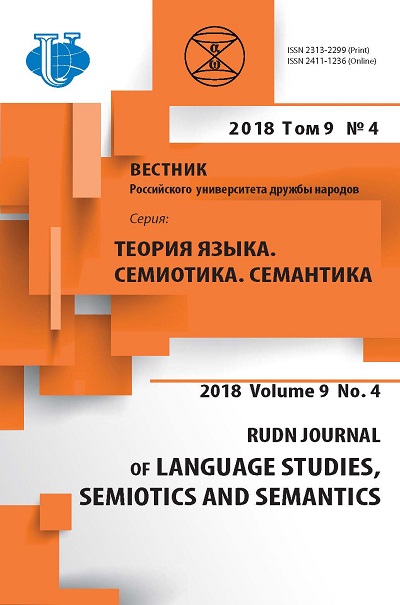COGNITIVE ASPECT OF ENGLISH-RUSSIAN METAPHOR TRANSLATION IN JULIAN BARNES’S TALKING IT OVER
- Authors: Lunkova L.N1, Pavlova M.S1
-
Affiliations:
- State University of Humanities and Social Studies - GSGU University
- Issue: Vol 9, No 4 (2018)
- Pages: 904-910
- Section: LANGUAGE THEORY
- URL: https://journals.rudn.ru/semiotics-semantics/article/view/20146
- DOI: https://doi.org/10.22363/2313-2299-2018-9-4-904-910
- ID: 20146
Cite item
Full Text
Abstract
The article focuses on the aspects of interpretation of fiction within the framework of cognitive metaphor analysis in Julian Barnes’s novel Talking it Over . The article begins with the overview of the major issues and the standard strategies of metaphor translation. Within the present paper translation is viewed as a process with relies on the translator’s competence to ‘dive into’ the source language continuum, 1. a different social and cultural dimension and disclose the interaction of the mind-scope of the author of the source text and the translator via the dialogue of cultures. There are two reasons due to which metaphor analysis can be conducted. Firstly, metaphors are typical in any natural language, so that’s why they can be translated. Secondly, the fact is that translation is always viewed as a phenomenon of cross-cultural communication, whereas metaphor is part and parcel of culture. Metaphor creates a significant challenge for the translator. There are some difficulties in the translation of metaphor. Culturally-bound metaphors are often misunderstood when they are translated from the source language into the target one. Optimizing cross-cultural communication can be done within the “author-text-reader” interpretation triangle when the translation should be accompanied by a cognitive interpretation and lingvocultural commentaries.
About the authors
Larisa N Lunkova
State University of Humanities and Social Studies - GSGU University
Author for correspondence.
Email: lora@list.ru
Dr. habilis, Professor of the English Language Department, Faculty of Foreign Languages. Sphere of scientific research: theoretical and applied linguistics, text and discourse analysis
Russia, Kolomna, Zelyonaya str., 30, 140410Maria S Pavlova
State University of Humanities and Social Studies - GSGU University
Email: marija-pavlova1993@yandex.ru
fourth year PhD student of the Linguistics and Cross-Cultural Communication Department, Faculty of Foreign Languages. Sphere of scientific research: text and discourse studies, text analysis
Russia, Kolomna, Zelyonaya str., 30, 140410References
- Barnes, J. (2004). Talking it Over. Love, etc. Metroland Novels. Moscow: AST Publishing House, LLC: OJSC ‘LUKS’.
- Barkhudarov, L.S. (1975). Language and Translation. Aspects of General and Special Translation Theory. Moscow: Mezhdunarodnie Otnosheniya.
- Dridze, T.M. (1996). Socail Communication As Textual Activity In Semiosociopsycology. Obshchestvennyye nauki i sovremennost, 3, 145-152.
- Kuznetsov, V.G. (2011). Cognitive Aspect of Implicit Motivation of the Language Sign. Voprosy kognitivnoy lingvistiki, 1, 15-22.
- Markovina, I.Yu. & Sorokin, Yu.A. (2008). Culture and text. Introduction to Lacunology: A Textbook. Moscow: GEOTAR-Media.
- Fosenko, T.A. (2002). Translation Process Modeling Within The Context Of Matter of Consciousness. In Mezhkulturnaya kommunikatsiya i problemy natsionalnoy identichnosti: Sb. nauch. tr. Voronezh: Voronezh. Gos. un-t. pp. 125-134.
- Barnes, J. (1991). Talking it over. Vintage Books: Random House, Inc., New York.
- Newmark, P. (1998). The Translation of Metaphor. Approaches to Translation. New York.
Supplementary files












